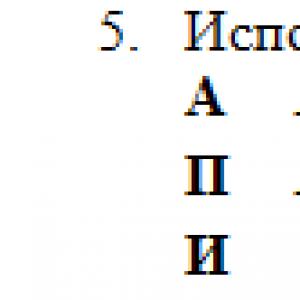Subordinate clauses of purpose with the conjunction damit. Word order in a German compound sentence Sentence with damit and dazu
Subordinate clauses of purpose answer the question “Wozu?” (For what?) and “Zu welchem Zweck?” (For what purpose?).
If both parts of the sentence talk about the same subject, then the subordinate clause of the goal is connected to the main clause with the conjunction “um”, followed by all other members of the sentence, and the infinitive with “zu” appears at the end of the sentence.
Ich(= I) = ich(= I)
- Ich lerne fleißig Deutsch. Ich will in Deutschland studieren.
I'm studying German hard. I want to study in Germany. - Ich lerne fleißig Deutsch, um in Germany zu studieren.
I am studying German hard so that I can study in Germany.
- Zwei Škoda-Automechaniker fahren in ein einsames, österreichisches Alpendorf, um Ski zu fahren.
Two Škoda auto mechanics travel to a secluded Austrian Alpine village to go skiing.
In a sentence with “um…zu” the modal verb “wollen” is not used.
- Laura sieht sich oft Filme an. Sie will mit den Freunden darüber reden.
Laura often watches films. She wants to talk about it with her friends. - Laura sieht sich oft Filme an, um will mit den Freunden darüber zu reden.
Laura often watches films to talk about it with friends.
If both parts of the sentence have different subjects, then the subordinate clause of the goal (Finalsatz) is connected to the main clause with the conjunction “damit”. After the conjunction, there is a subordinate clause (subject + other members of the sentence + predicate at the end).
Ich(= I) ≠ my Chef(= My boss)
- Ich lerne fleißig Deutsch. Mein Chef soll zufrieden sein.
I am studying German. My boss should be pleased. - Ich lerne fleißig Deutsch, damit mein Chef zufrieden ist.
I'm learning German to make my boss happy.
In complex sentences, subordinating conjunctions are used to link subordinate clauses to the main clause. Subordinate clauses, as a rule, perform the functions of secondary members - definitions, additions, circumstances. Conjunctions are used to connect with the main subordinate clauses as complements and adverbials; attributive clauses are tied to the main clause using relative adverbs and pronouns. Subordinating conjunctions have a special impact on the word order in the subordinate (depending on the main) clause. Their use dictates a strictly defined word order in the subordinate clause, which looks like this: “subordinating conjunction + subject + (additions, circumstances) + predicate: non-conjugated part + predicate: conjugated part (last place), for example:
- Während (conjunction) ich (subject) das Material (object 1) für meinen Bericht (object 2) durchsah (predicate), erinnerte ich mich an ein ganz wichtiges Detail. – While I was looking through the material for my report, I remembered one very important detail.
Subordinating conjunctions in German
Russian Union | German Confederation | Example |
||
TEMPORARY 1. Simultaneous (parallel) actions in the main and subordinate clauses |
||||
| "when = once" | "als" | Als es zu regnen begann, waren wir schon vor dem Theater. – When it started to rain, we were already in front of the theater. | ||
| "when = many times" | "wenn" | Wenn wir auf dem Lande sind, grillen wir oft Schweinefleisch. – When we are out of town, we often grill pork. | ||
| "while" | « » | An diesem Tag hat sie gefrühstückt, indem sie frische Zeitungen gelesen hat. “That day she had breakfast while reading the latest newspapers. | ||
| "while" | "indessen" | Ich schäle Kartoffeln, indessen meine Freundin Gurken schneidet. — I’m peeling potatoes, while my friend is chopping cucumbers. | ||
| "Bye" | "solange" | Solange du Fieber hast, darfst du nicht aufstehen. “As long as you have a fever, you can’t get up.” | ||
| "when = whenever" | "soft" | Sooft ich in unserer Kantine esse, fühle ich mich danach nicht wohl. – When I eat in our dining room, I always feel unwell afterward. | ||
| "when = while" | "während" | Während wir bei unseren Bekannten in Köln waren, gingen wir oft in den Dom. – When (while) we were visiting our friends in Cologne, we often went to the cathedral. | ||
2. Preceding the action of the main clause |
||||
| "when = after" | "als" | Als Marta ihrer Schwester die Geschichte erzählt hatte, begann sie zu weinen. – After Martha told this story to her sister, she began to cry. | ||
| "after" | "nachdem" | Nachdem ihr Fuss geröntgt worden war, entschied der Arzt, ihn einzugipsen. “After she had an X-ray of her foot, the doctor decided to put her in a cast. | ||
| "since" | "seitdem" | Seitdem sie nach Österreich gefahren ist, hören wir nichts von ihr. – Since she left for Austria, we have not heard anything about her. | ||
| "as soon as" | "sobald" | Sobald ich den nächsten Chemieunterricht habe, frage ich meinen Lehrer danach. – As soon as I have my next chemistry lesson, I will ask my teacher about it. | ||
3. Following the action of the main clause |
||||
| "before" | "bevor" | Bevor ich dir das nächste Buch gebe, musst du dieses bis zum Ende gelesen haben. | ||
| "until" | "bis" | Du darfst deinen Mund nicht öffnen, bis ich winke. – You are not allowed to open your mouth until I nod (give a sign). | ||
| "before" | "ehe" | Ehe du in den Flughafen gekommen bist, ist er schon abgeflogen. - Before you arrived at the airport, he had already left. | ||
COMPARATIVE |
||||
| “than, as – als”, “as – wie”, “as if, as if – als ob”, “as if, as if – als wenn”, “as if – wie wenn”, “so that – als dass”, “than ... that - je... desto", "than... that - je... je" | Er sah so aus, als ob er die Nacht nicht im Bett, sondern am Computer verbracht hatte. – He looked as if he had spent the night not in bed, but at the computer. | |||
CAUSAL |
||||
| “because - da”, “since, since - weil” | Unsere Familie hat diese Wohnung gemietet, weil sie in der Nähe von meinem Büro ist. – Our family rented this apartment because it is located near my office. | |||
INVESTIGATIVE |
||||
| “so that - als dass”, “so (as a result of which) - so dass = sodass” | Jetzt ist es schon sehr dunkel, als dass wir noch spazieren gehen könnten. “It’s already too dark to go for a walk.” | |||
TARGET |
||||
| “(so that) in order to - damit”, “so that - dass” | Ich habe ihm einige Bücher mitgegeben, damit er sie in Ruhe liest. — I gave him several books with me so that he could read them in peace. | |||
CONDITIONS |
||||
| “if - wenn”, “(in case) if - falls”, “(in case) if - im Falle dass” | Falls er nach St.Petersburg kommt, kann er wieder bei uns übernachten. – If he comes to St. Petersburg, he can spend the night with us again. | |||
CONDITIONAL |
||||
| “although – obwohl”, “despite the fact that – obzwar”, “although – obgleich”, “although – obschon”, “although, even if – wenngleich”, “although – wenn auch”, “despite the fact what - trotzdem" | Bettina fährt mit ihrem Auto nach Hause, obwohl sie heute sehr viel Martini getrunken hat. Bettina is driving home in her car, although she drank a lot of martinis today. | |||
RESTRICTIVE |
||||
| “how much”: “(in)sofern”, “(in)wiefern”, “(in)soweit”, “(in)wieweit”, “soviel” | Soweit es uns bekannt ist, wohnt er allein. — As far as we know, he lives alone. | |||
MODAL (MODES OF ACTION) |
||||
| "since, therefore, because - | ||||
indem»Ihr könnt euren Planeten retten, indem ihr der Umwelt helft. – You can save your planet by helping the environment.
“without that, so... not - ohne dass”Er verliess den Zuschauerraum, ohne dass er jemanden störte. - He left the auditorium without disturbing anyone. “Because - dadurch dass” Er stört mich dadurch, dass er ständig pfeift. “He bothers me by whistling all the time.”
After alliances aber - but, und - and, and, sondern - but, but, denn - because, oder - either, either subordinate clauses use direct word order.
Die Eltern fahren nach Italien für die Kinder
The parents are leaving for Italy, and the aunt will look after the children
Reverse word order
In subordinate clauses after conjunctions darum, deshalb, deswegen, sonst, trotzdem, dann, folglich used reverse word order. That is, the subject and predicate in the subordinate clause change places.
Präsens (Present)
Ich habe keines Auto. mit dem Bus zur Arbeit
Ich habe keines Auto, mit dem Bus zur Arbeit
I don't have a car, so I take the bus to work
Perfect (Past tense)
In this case auxiliary verb (haben/sein) to stand on first place after the union, and verb in third form leaves to the end subordinate clause.
Ich hatte keines Auto. mit dem Bus zur Arbeit
Ich hatte keines Auto, mit dem Bus zur Arbeit
I didn't have a car, so I took the bus to work
Inversion
In subordinate clauses after conjunctions dass (what), weil (because), wenn (if, when), falls (in case), während (bye), bevor (before; before), nachdem (after that), obwohl (though) - used inversion . That is verb in a subordinate clause goes to the end .
Präsens(Present tense)
keines Auto. Ich fahre mit dem Bus zur Arbeit
I don't have a car. I go to work by bus
Ich fahre mit dem Bus zur Arbeit, keines Auto
I go to work by bus because I don't have a car.
Ich Weiß, in der Schule
I know he is in school
Präteritum (Past tense)
keines Auto. Ich fuhr mit dem Bus zur Arbeit
I didn't have a car. I went to work by bus
Ich fuhr mit dem Bus zur Arbeit, keines Auto
I went to work by bus because I didn't have a car.
Perfect (Past tense)
In this case both verbs subordinate clause go to the end , but on last place put auxiliary verb or anyone else who was with the subject.
Ich habe ein Auto nicht gekauft. mit dem Bus zur Arbeit
I didn't buy a car. I went to work by bus
Ich habe ein Auto nicht gekauft, mit dem Bus zur Arbeit
I didn't buy a car because I took the bus to work
If the subordinate clause is with a conjunction wenn stands before the main clause, then the main thing often begins with the words so or Dann :
mein bald, ins Kino
If my friend comes soon, we'll go to the cinema
WENN or ALS
Wenn in the meaning of “when” is used if the actions in the main and subordinate clauses occur simultaneously. Also wenn in the meaning "when", used to emphasize recurrence actions:
nach Moskau, mich unbedingt
When he comes to Moscow, he always visits me
Als also translated “when”, but used in the past tense when one-time action:
meine Freundin, am Sonnstag im Theater
We met my friend when we were at the theater on Sunday
Construction of UM ... ZU and DAMIT
Union um...zu + Inf. and damit expresses target .
Er geht nach Deutschland, Deutsch
He goes to Germany to learn German
Ich schenke ihm ein Lehrbuch der deutschen Sprache, er deutsche Sprache
I give him a German textbook so he can learn German
Design (AN)STATT...ZU
Anstatt seine Hausaufgaben zu machen, sieht das Mädchen fern
Instead of doing her homework, the girl watches TV
Design OHNE...ZU
Sie geht, ohne sich zu verabschieden
She leaves without saying goodbye
Inversion with DER(DIE, DAS, DESSEN)
Union der ( die, das, dessen, den, dem ) expresses the definition.
Ich fahre in der Stadt, in meine Verwandten
I'm going to the city where my relatives live
After studying the material in this lesson, you will be able to:
- find out where registration takes place
- ask when the meeting opens
- find out when sections meet
- ask where to find the section leader
Learn words and expressions for dialogue
| die Tagung T A: gun(g)
meeting, session |
Die Tagung findet morgen statt. The session will take place tomorrow. |
| vertical theater e: heating element
introduce |
Welche Firma vertreten Sie? What company do you represent? |
| die Wirtschaft V And RTshaft
economics, economy |
Wir vertreten die Wirtschaft. We represent the economy. |
| das Institute institute y: T
institute |
Er studiert in einem Institut. He studies at the institute. |
| sich anmelden zikh A nmelden
sign up, register |
Sie müssen sich anmelden. You must register. |
| die Information information O: n
information |
Wo bekomme ich diese Information? Where can I get this information? |
| das Büro bureau O:
bureau, office |
Wo ist das Bureau der Firma? Where is the company office? |
| eröffnen e(a/r)b e fnen
open |
Wann wird die Ausstellung eröffnet? When does the exhibition open? |
| die Section zektsy O: n
section |
Ich interessiere mich für Section 2. I'm interested in section 2. |
| die Sitzung h And tsun(g)
meeting |
Die Sitzung ist eröffnet. The meeting is declared open. |
| tagen T A: gen
sit |
Wann tagt die Sektion 4? When does Section 4 meet? |
| der Leiter l A yta
supervisor |
Kann ich den Leiter sprechen? Can I talk to the manager? |
| die Pause n A use
break |
Wollen wir eine Pause machen! Let's take a break! |
| die Wissenschaft V And sunshaft
science |
Er ist ein Mann der Wissenschaft. He is a man of science. |
| warum var at m
Why |
Ich weiß nicht, warum das so ist. I don't know why this is so. |
| been den bae uh nden
end |
Die Tagung ist beendet. The session is over. |
Pay attention to the form and use of words
From the verb (sich)anmelden“to register)”, “to register” can be formed as a noun die Anmeldung“registration”, and sometimes “pass office” (at the entrance to any institution, factory, etc.). Expression Ich bin angemeldet is translated “I have an appointment.”, “I have agreed (to visit).,” “They are waiting for me.”:
Hat Dr. Hirsch Sprechstunde? - Fragen Sie bei der Anmeldung.
Is Dr. Hirsch accepting? - Ask at the reception.
Sind Sie angemeldet? You Deal(about admission)? (Are they waiting for you?)
Nouns die Tagung And die Sitzung are translated “meeting” and are often used in the same context. Word die Tagung means “meeting”, “session” lasting several days, while the word die Sitzung“meeting” means a one-time work of any body:
die Tagung der UNO
UN session
die Sitzung des Vorstandes
board meeting
Unlike the verb öffnen“open” (door, book, window, etc.), verb eröffnen means “to open” (a meeting, an exhibition, etc., as well as something for the first time: a museum, a stadium, etc.).
Remember the following word formation method (2)
die Wirtschaft + -lieh = wirtschaftlich economic, economic
die Wissenschaft + -lieh = wissenschaftlich scientific
Practice reading individual words
Vor der Tagung
| S. | Guten Tag! Ich vertrete ein Wirtschaftsinstitut. Wo ist die Anmeldung? |
| A. | Im Erdgeschoß links. |
| S. | Wo bekomme ich das Arbeitsprogramm? |
| A. | Im Informationsburo. |
| S. | Wann wird die Tagung eröffnet? |
| A. | Morgen um 10 Uhr. |
| S. | Wann finden die Sektionssitzungen statt? |
| A. | Die Sektionen tagen mittwochs bis freitags. |
| S. | Wo finde ich den Leiter der Sektion 3? |
| A. | Er fehlt im Augenblick. |
| S. | Wann findet die Tagung der Sektion 3 statt? |
| A. | Am ersten Arbeitstag nach der Pause. |
Grammar explanations
You already know that indefinite form verb (infinitive), referring to another verb (except modal), noun or adjective, used with a particle zu and can form an infinitive group, usually separated by a comma ( see lesson 3, lesson 2):
Ich habe versucht, den Flug für den Montag zu buchen.
I tried order air ticket for Monday.
If the infinitive group expresses the purpose of the action, then it is used with the word um“so that”, which comes at the beginning of the group:
Ich rufe die Auskunft an, um nach der Abfahrt des Zuges zu fragen.
I call the information desk to ask about the departure of the train.
Um zu tanken, fahre ich zur Tankstelle.
To refuel, I'm going to the gas station.
Design with um used in cases where the infinitive group implies the same character as in the main clause:
Wir müssen uns beeilen, um den Zug nach Munich zu Schaffen.
We must hurry up to be on time on the Munich train.
(We hurry up and We we want to be on time)
In cases where different subjects are implied, instead of the infinitive group, the subordinate clause of the goal with the conjunction is used damit"to":
Ich hole ihn ab, damit er den Letzten Zug schafft.
I I'll pick him up to he managed on the last train.
(I I'll stop by to He managed)
In subordinate clauses with a conjunction damit The present tense of the verb is used.
Translation of the conjunction “so that” into German
He said, to We booked our flight ticket this week.
Er sagte, dass wir den Flug noch an dieser Woche buchen sollen.
We're going to the station to meet our comrades.
Wir fahren zum Bahnhof, um unsere Kollegen abzuholen.
I called the workshop to they towed my car.
Ich rief die Werkstatt an, damit sie meinen Wagen abschleppen.
1. You do not know when the meeting (session, etc.) opens. Ask. What answer would you give if you were the other person?
2. You are asked why you are going to the information office. Answer. What question would you ask if you were the other person?
3. They ask you why you need to go to the gas station. Answer. What question would you ask if you were the other person?
4. You are asked if a certain document is ready. Answer in the negative. What would you ask if you were your interlocutor?
You can understand what a German subordinate clause is by looking at the following example diagram:
As you can see, a subordinate clause can appear either before or after the main clause.
In a subordinate clause the predicate is worth last. If the predicate is composite, then the conjugated part is in the very last place, and the unchangeable part is in front of it. The negation “nicht” comes before the predicate. Detachable attachments do not separate. The subject comes immediately after the conjunction.
You can see the word order in a German subordinate clause in this diagram:

Thus, it is very important to remember that the predicate comes at the end of the predicate sentence. The predicate is most often a verb. The inflected and conjugated parts appear when, for example, we have a modal verb. Ich kann kommen. kann - conjugated part, kommen - unchangeable part.
There are several types of subordinate clauses. Below we provide a table of types of subordinate clauses, which includes introductory words (conjunctions, pronouns), followed by the above-described word order in the subordinate clause.
Main types of subordinate clauses:
1) Reasons:
Ich komme nicht, weil ich krank bin. I won't come because I'm sick/sick.
Ich mache das Fenster auf, da es mir zu heiß ist. I'll open the window because I'm too hot.
2) Goals:
Ich lerne Deutsch, damit ich eine gute Arbeit finden kann. I'm learning German so I can find a good job.
Ich arbeite viel, damit meine Kinder alles haben. I work hard to ensure that my children have everything.
If the characters in the main and subordinate clauses coincide, then you can use a turnover with um... zu:
damit ich Deutsch lerne. I came to Germany to learn German.
Ich bin nach Deutschland gekommen, um Deutsch zu lernen. I came to Germany to learn German.
3) Conditions:
Wenn es morgen nicht regnet, gehen wir in die Berge. If it doesn't rain tomorrow, we'll go to the mountains.
Falls Sie Kinder haben, bekommen Sie eine Ermäßigung. If you have children, you will receive a discount.
4) Time:
Wenn du nach Hause kommst, ruf mich bitte an. When you get home, please call me.
Während ich arbeite, sind meine Kinder im Kindergarten. While I work, my children are in kindergarten.
Als ich acht war, habe ich das Schwimmen gelernt. When I was eight years old, I learned to swim.
Seitdem ich in Moskau wohne, habe ich immer einen guten Job. Since I live in Moscow, I always have a good job.
Wir haben noch eine Stunde Zeit, bis die Gäste kommen. We still have an hour before the guests arrive.
Sobald du fertig bist, fangen wir an. As soon as you are ready, we will begin.
Bevor ich einkaufen gehe, schreibe ich mir immer eine Einkaufsliste. Before I go shopping, I always write myself a shopping list.
Nachdem ich die Prüfung bestanden habe, kann ich mich erholen. After I have passed the exam, I can rest.
5) Places and directions:
Ich möchte wissen, wo wir sind. I would like to know where we are.
Ich weiß nicht, wohin dieser Weg fuhrt. I don't know where this road leads.
6) Concessions:
Obwohl es regnet, gehe ich spazieren. Even though it's raining, I'll go for a walk.
7) Comparisons:
Je mehr Geld ich verdiene, desto mehr Steuern muss ich bezahlen. How more money I earn, the more taxes I have/have to pay.
Sie sprechen besser Deutsch, als wir erwartet haben. You speak German better than we expected.
8) Additional subordinate clause:
Man sagt, dass Benzin bald wieder teurer wird. They say that gasoline prices will soon rise again.
Können Sie mir bitte sagen, wie dieses Gerät funktioniert? Can you tell me how this device works?
Ich weiß noch nicht, ob ich morgen ins Schwimmbad gehe. I don't know yet whether I'll go to the pool tomorrow.
9) Determinative subordinate clause:
Ich möchte einen Mann heiraten, der mich immer verstehen wird. I want to marry a man who will always understand me.
Ich möchte eine Frau heiraten, die mich nie betrügen wird. I want to marry a woman who will never cheat on me.
Ich möchte ein Kind haben, das mich niemals enttäuschen wird. I want to have a child who will never disappoint me.
Ich möchte diesen Film sehen, von dem alle sprechen. I would like to see this movie that everyone is talking about.
And here are those unions that DO NOT INFLUENCE on the word order of the sentence they enter:und, aber, denn, oder, sondern
The word order after these conjunctions is exactly the same as in the main clause: the conjugated part of the predicate is in second place.
Er antwortete sicher, denn er hatte sich auf die Prufung gut vorbereitet.
He answered confidently because he had prepared well for the exam.
Ich habe keine Zeit, und ich gehe nicht zum Fußball.
I don't have time and I won't go to football.
Exercise: Insert suitable conjunctions
1) ...du willst, begleite ich dich nach Hause.
2) Ich muss viel arbeiten,... ich genug Geld habe.
3) ... ich krank bin, muss ich meine Arbeit erledigen.
4) Ich weiß nicht,... wir machen sollen.
5) ... du das nicht machst, rede ich nicht mehr mit dir.
6) Ich gehe nach Hause,... ich müde bin.







